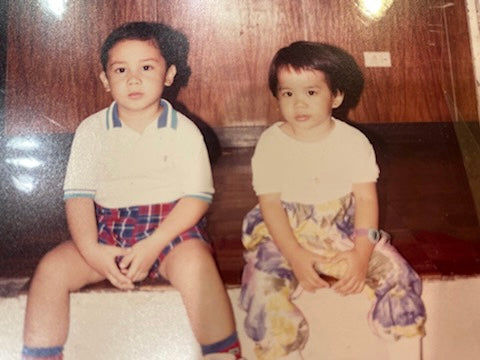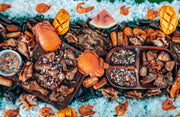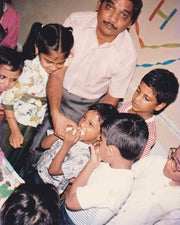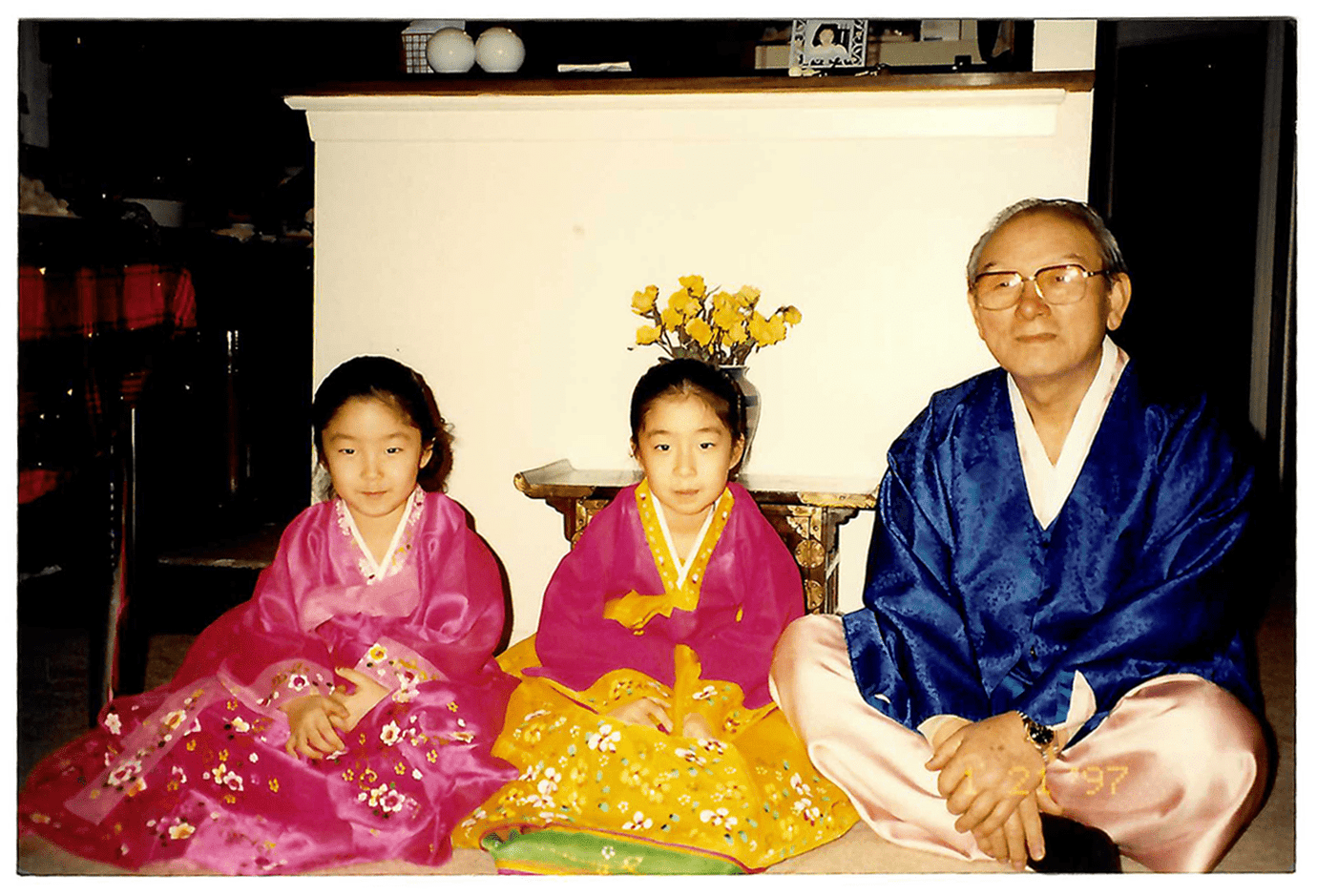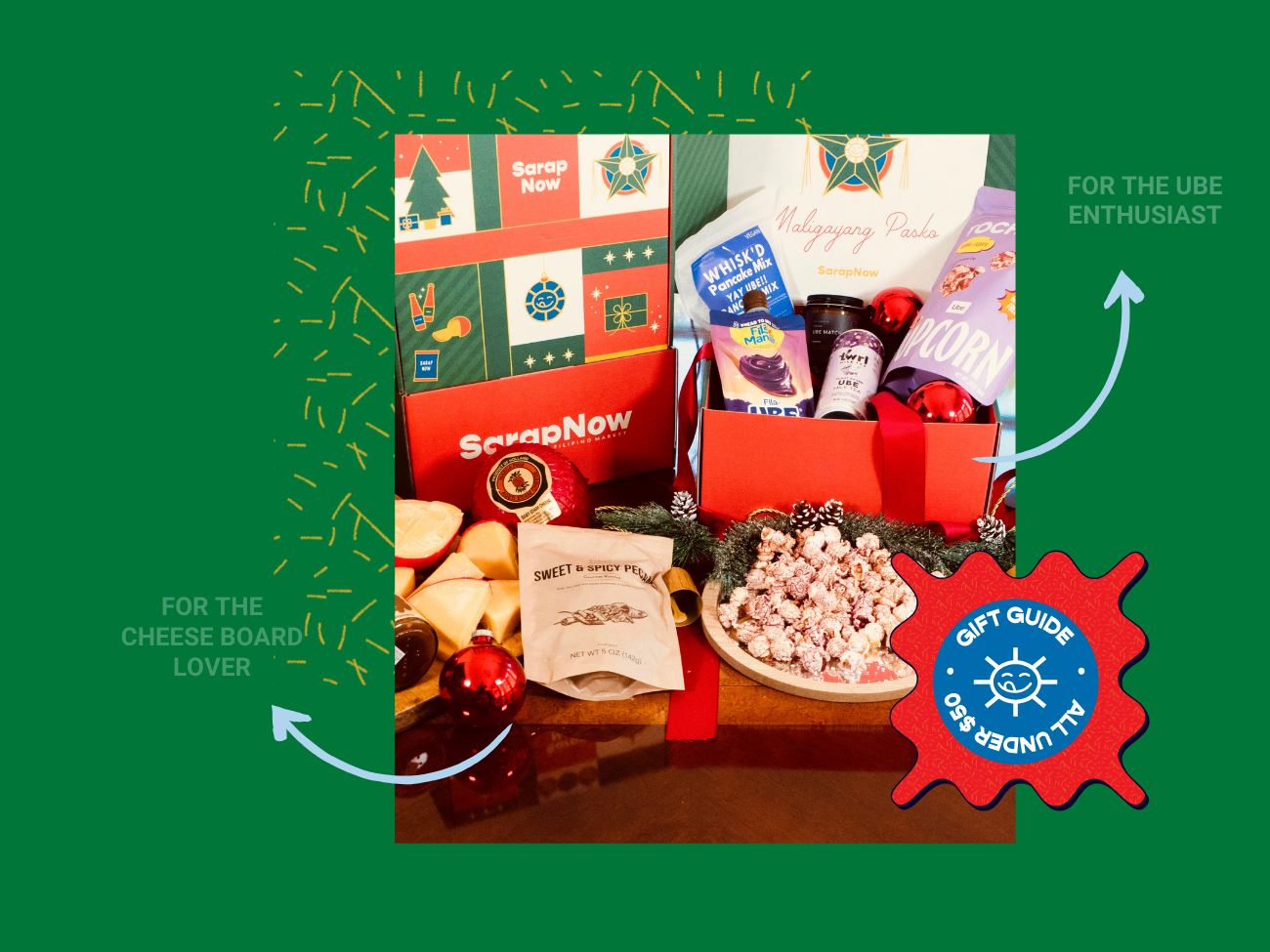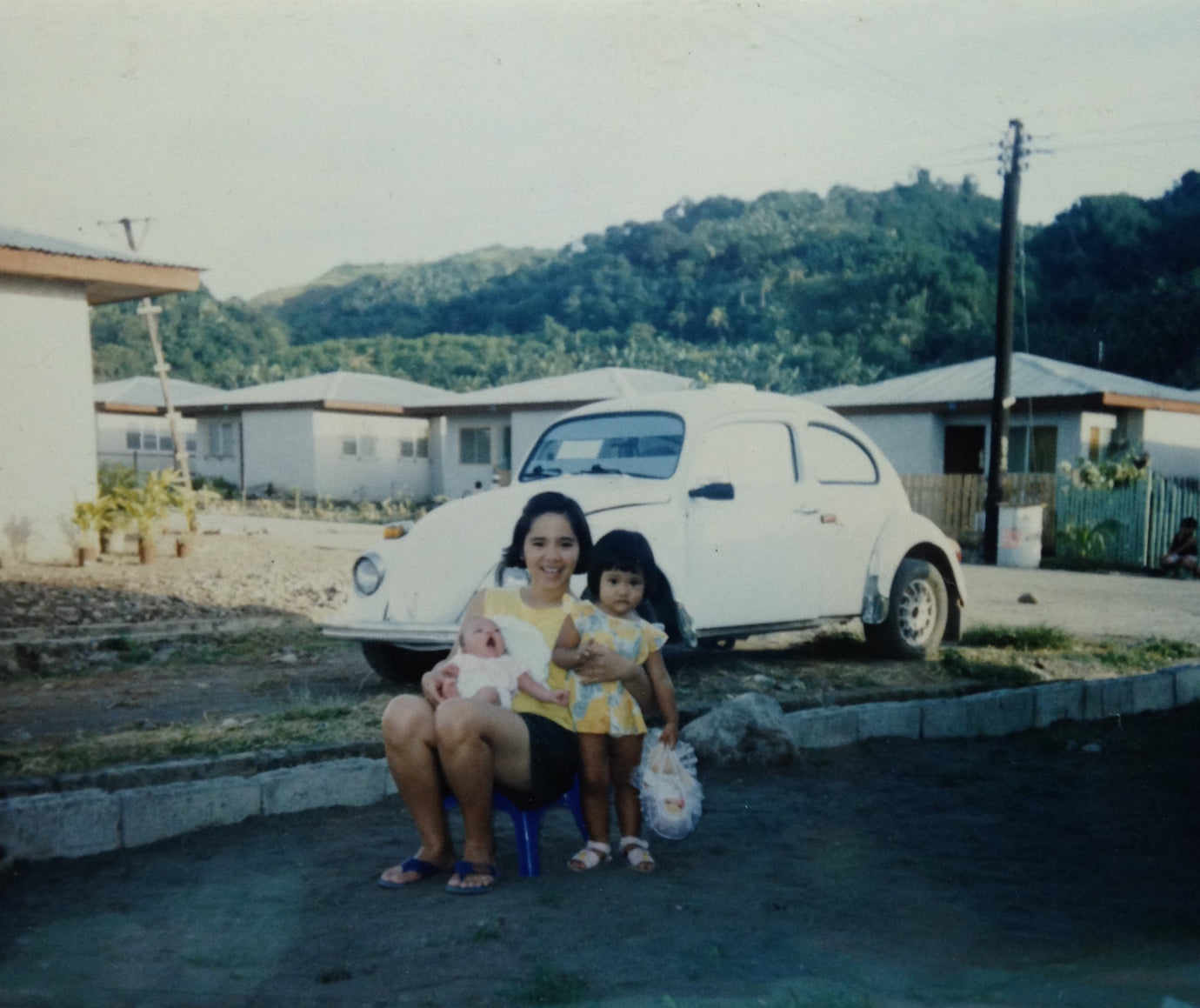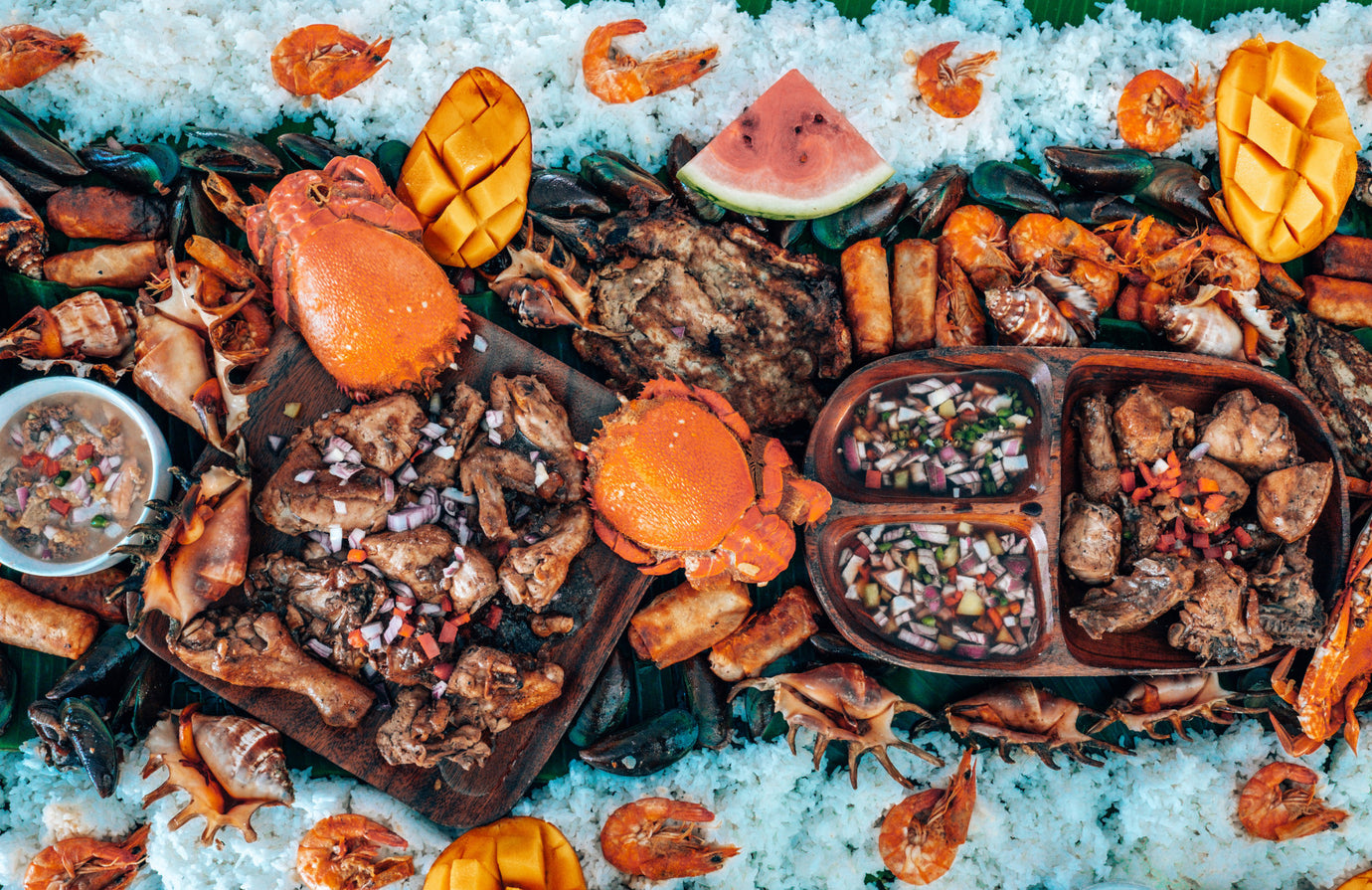Welcome to Sarap Stories - your space for Asian American representation, inspiration, and insights from real AAPI makers in the Sarap Now marketplace.

Source: Victoria and Miggy Reyes
Narra’s sibling co-founders Victoria and Miggy Reyes are multi-hyphenates with a shared passion for giving back.
Victoria – a former consumer packaged goods (CPG) executive, Starbucks and The Honest Co. alumnus, and founding member of multiple startups – and Miggy – an ex-Intel engineer and Tesla tech-pro-turned-chef – officially launched their brand of ready-to-drink oat milk lattes in July.
Described as the perfect afternoon pick-me-up, Narra is reinvigorating the tea aisle with Asian-inspired flavors like Black Milk Tea, Roasted Oolong, and Strawberry Matcha. But tea lattes are just the beginning.
Inspired by their grandparents’ selflessness and deep care for their community, Victoria and Miggy are committed to paying it forward. First, by increasing Filipino immigrant representation on shelves and at the founder level, and in the future, as mentors and non-profit organizers benefiting Filipino youth.
Read on to learn how this brother-and-sister duo chose to be brave, closed their first fundraising round, and launched a brand that’s true to their Filipino and American values.
This interview has been edited for length and clarity.

Source: Victoria and Miggy Reyes
Tell me about yourselves - can each of you share your name, pronouns, and roles at Narra?
V: I’m Victoria Reyes, my pronouns are she/her, and I’m one of the co-founders of Narra. I oversee DTC, marketing and supply chain, given my background as an operator.
M: I’m Miggy Reyes – Miggy is short for Miguel. I’m the co-founder of Narra and I’m mainly in charge of product development, retail distribution, and fundraising. I used to be a chef, so naturally, I leaned into product development and developing our flavors.

Source: Victoria and Miggy Reyes
Do you identify as AAPI or immigrants of Asian heritage? What were both of your experiences like growing up in or immigrating to America – whichever applies?
M: I definitely identify as an immigrant. I was born and raised in the Philippines. When we moved to the U.S., I had just finished my freshman year of college at the University of the Philippines.
V: I consider myself both. I moved here when I was a senior in high school, so I’ve spent half my life in the Philippines and half here.

Source: Victoria and Miggy Reyes
M: We grew up in Metro Manila in Pasig. I remember a lot of playing in the streets – that was like our front yard. My sister and I would walk down to the Sari Sari store around 3 pm every day. At the time, you could spend a few Peso coins and that would be a solid merienda. We’d pick up chichirya – Sweet Corn or Chippy or whatever – and a plastic bag of soda.
We also visited our grandparents in Pangasinan a lot. There wasn’t internet, TV or any electronics when you were there. There wasn’t even hot water – you used a tabo to bathe.

Source: Victoria and Miggy Reyes
V: And tabo to flush! That was a whole other experience.
Our grandparents’ home meant a lot to us growing up. Our Lola was the mayor of this small town in Pangasinan, but she was also a doctor, so she had a little clinic in her home. Our Lolo had a farm.
Our grandparents gave so much to the community and spent most of their time giving free care to those in need, always having food available so no one was hungry, and giving jobs on the farm to those who needed work. There was an open-door policy.
My childhood years set the foundation of who I am and what I value in terms of family, faith, and character. I want to give back to my community because that's what I witnessed in my Lola and everyone in the Philippines. So we carry on a lot of that spirit.

Source: Victoria and Miggy Reyes
M: I feel fortunate to have been born and raised in Metro Manila, while also seeing the rural life in Pangasinan.
When we first moved to the U.S., we lived in Arizona. Victoria was 17 and I was 19. I remember it being rough on her because she was a senior in high school and all the cliques were already formed.

Source: Victoria and Miggy Reyes
V: Yeah, when I moved here, I wanted to be like everyone else, so I removed my accent and practiced sounding American because I wanted to assimilate. It was my way of coping and a lot of my friends can relate.
But now, I've come to a point where I embrace my Filipino identity and I consider myself Filipino-American.
We're using a lot of Filipino and American values to get our brand out there.
The work ethic of Filipinos is unparalleled. We’re so hardworking and we don’t give up, which is really what Narra means. “Narra” is the national tree of the Philippines and it symbolizes the strength and resilience of our people. We embody that strength and resilience in our brand.
On the American side, we focus on an abundance mentality, rather than the more fear-based mentality we were raised with.
M: On work ethic – Filipinos work hard, work harder, and work hardest – sometimes to a fault. What we’re trying our best to do is take on what we’ve learned in the U.S., such as working smarter so we’re more efficient.
What inspired you both to create Narra? Walk me through what led you to become entrepreneurs.
V: My background is in the consumer product goods (CPG) world and I’ve worked in supply chain and marketing. I worked for big companies like Starbucks, but eventually, I felt like a cog in the wheel. I wanted to make a bigger impact but I just didn’t know what that looked like yet.
I kept moving to smaller and smaller companies where I could provide more value. I went to The Honest Co. next, where I learned how to be scrappy and wear many hats – a skill that helps me today as an entrepreneur. After that, I became the founding member of a few startups, which gave me the confidence to establish Narra.

Source: Victoria and Miggy Reyes
Miggy and I started talking about Narra during COVID. Over the pandemic, I started a side hustle selling DIY Bubble Tea Kits – it was my first taste of doing something for myself, but it wasn’t fulfilling my personal mission at the time. That’s when Miggy and I looked at each other and realized our strengths really lined up and we could do this together.
It came down to two things: (1) we wanted to help increase representation on shelves and (2) we wanted to impact the community. We want to bring more representation as founders because there aren’t many Filipinos in corporate leadership.
Eventually, we want to pay it forward in the Philippines because we are so grateful for the opportunities and the blessings that we have here. I firmly believe that it takes a village, and so I want to help provide mentorship to young Asian women and teach them that it’s okay to ask for help.
M: My end goal in all of this is to help the Philippines.
Victoria brought this up earlier, but our Lola was a medical doctor. She had a clinic beside the house and she wouldn't charge anyone who couldn’t afford care. If you or your kids were sick, she said to come in. So she’d have sacks of mangoes or corn in her office because her patients wouldn’t accept free care – they’d pay with their harvest. She never insisted but she'd accept it, then serve it on the table for the other patients to eat.
I’ve seen my Lola give back to the community in so many ways and I want to do the same.
That's the reason why I quit tech – I worked at major tech companies like Intel and Tesla, but thought, “How are you going to use your tech skills to help the Philippines?” It didn’t line up with my mission, so I quit and became a chef. I saw that with food, there's a more direct goal because there are a lot of starving children, poverty, and food insecurity in the Philippines.

Source: Victoria and Miggy Reyes
I see myself one day starting a nonprofit culinary school in the Philippines, run by some of the top chefs in the country. What I love about this plan is that it helps kids gain life skills like cooking and a way to work, so they have a pathway out of poverty and don’t have to resort to crime or drugs. The kids would also play a part in developing their regional cuisines and pushing forward Filipino cuisine as a whole.
All of this is to say that Narra is a part of that grand plan. With Narra, I’m connecting with more and more people who could help me on my journey.
When we shop for Asian groceries at H Mart or 99 Ranch, we realize a lot of products have a ton of artificial ingredients or 30 grams of sugar – it’s not good! We can’t just chug bags of soda anymore like we used to, so we made Narra so that we can still enjoy merienda, but with a healthier choice.

Source: Victoria and Miggy Reyes
Tell me about a challenge you faced to get to launch. How did you overcome it?
M: The biggest one was fundraising. Female founders with all-women teams received only 1.9% of venture capital last year – so if you're a minority, BIPOC, and a female founder, the odds are stacked against you.Then you add what happened last year. Russia launched a military campaign in Ukraine. The stock market started tanking. Crypto crashed. FTX founder was jailed. And in December, everyone said we’re heading into a recession.
We were fundraising during that time! It was the hardest time in the world to raise money, pre-product, pre-sales!

Source: Victoria and Miggy Reyes
We’re blessed to be following this trailblazing wave of other Asian founders who have fundraised in 2018, 19, and 20. Their mentorship and example allowed us to see that it is possible.
And when our scarcity, third-world mentality kicked in, we deleted it from our mind. We kept telling ourselves: You're in America and the pie is so large – swap that with an abundance mentality! It will be done. It can be done.
We started fundraising at the end of Q3 last year, and we closed literally on December 27th, 2022, which goes to show that Narra is about strength and resilience, right?

Source: Victoria and Miggy Reyes
On branding – you’ve created a gorgeous product. Tell us about your branding and why you made certain design decisions.
V: We knew we were going to launch omnichannel in DTC and retail, so we were specific about our positioning so that we could win in the ready-to-drink tea category.
If you look at the tea category, it's dull and neutral – all browns and greens – and consist of the same flavors like vanilla and chocolate. We wanted the vibrancy of Asian and Filipino culture to wake up the category because it's ripe for change.
Being a retail-forward brand, we needed to make sure that our product was straightforward about communicating that it’s a light and refreshing drink, and the perfect afternoon pick-me-up or coffee alternative. We wanted the matcha, strawberry, black tea, and oolong tea to be clear so there's no second-guessing what they are.
FIlipino textiles were also important to us to incorporate. Filipino culture is too vibrant and beautiful not to share!
M: Yeah, what looks like an innocent checkerboard pattern is banig – the handwoven materials that make up sleeping mats, hand held fans (pamaypay) to keep you cool at church, and baskets (bayong) at the farmer's markets. We sneak in nods to our Filipino heritage in a tasteful way.
How are consumers responding to your brand’s nod to Asian flavors and the Filipino tradition of merienda?
V: It’s cool because our merienda campaign was pretty much our story for why we created Narra and how you should enjoy it – as your midday pick-me-up, just like a siesta, to sip, snack, and recharge. Many cultures have their own merienda rituals - they’re just called different names.
With Narra, we've focused on meeting customers’ needs while celebrating our culture. Narra solves the need for an afternoon pick-me-up and other problems as well – whether you need more interesting flavors, or you're lactose intolerant like us, or you can't consume sugar.
In terms of response, people love having an alternative to coffee with just the right amount of caffeine. Roasted Oolong has been a crowd favorite because it's something that they haven't tasted before. We were surprised by that because Oolong isn’t a flavor many people are familiar with, but in terms of re-order rates, people keep coming back for Oolong!
We chose to educate on the flavors as opposed to what the product is (consumers generally know what oat milk lattes are). It’s cool to see our efforts working as we continue to learn and improve.
What advice do you have for aspiring AAPI entrepreneurs – anything you wish you knew when you started?
Overcome fear by taking it one step at a time.
V: Launching a brand doesn’t happen overnight. Our journeys took years, whether we knew it or not, so if you have an idea or a dream, work towards that step-by-step.
If fear is holding you back, I like to compare it to going to the gym. If you have a specific goal, like building muscle, you go to the gym and work out. Fear is a muscle to practice overcoming every day as well. Take the first step until you get better at it and build muscle memory to better manage your fear.
I wouldn't have felt ready if I hadn’t taken the step to move to a smaller company, start my side hustle during COVID, or meet with Miggy and have those conversations. So all of those were building blocks to ultimately what we aspire Narra to be – a household name. Lattes are just the beginning.
Being an entrepreneur can feel overwhelming. You have this dream, but you don't know what to do. Or it feels like so much that you don't know where to start. But once you carve out that little bit to get to where you need to be, and you ask for help, you can see it start to take shape.

Solve a problem.
M: We get asked this question in terms of technical advice, and we'll always say, definitely solve a problem. Don't create a brand to simply create a brand. Don't simply create or design a product for its features and functionality and whatnot. Solve a problem and your business will have legs. Make sure your target market is big enough. Make sure you “MVP” something - use the crawl, walk, run analogy.
Be brave. Jump!
M: There's a quote by Henry Ford, “Whether you think you can or you can't, either way, you're right.”
This quote resonates with me because I see so many smart, successful people get stuck because they’re thinking too much. Just be brave. Jump.
In my career, I quit a well-paying job in tech to become a chef and then I became an entrepreneur. Some people would label me as reckless. Others would label me as brave. I tend to just jump and I’m secure enough in myself that I know I'll land on both my feet.
We are only starting to see more Filipino-owned food and beverage brands emerge. What do you think needs to happen so that there is more AAPI representation in mainstream spaces?
M: Easy answer. We need to keep doing this – sharing our stories. We need visibility to show the next generation and even the current generation what’s possible. A lot of different Asian-centered organizations are doing a great job at this, like Kultivate Labs / SoMa Pilipinas in San Francisco.
There’s a saying that “it's hard to be what you don't see.” We didn’t see a lot of Southeast Asian – drilling deeper – Filipino – or even deeper – Filipino immigrants – starting businesses, and that fueled us to start one together.
V: That’s the biggest reason why Miggy and I teamed up. It's rare to see a brother-and-sister duo work together, let alone found a company. But we resonated with this need for more representation, especially being immigrants.
What’s something you both love about your culture that you wish more people knew about?
M: Filipinos love celebrating everything. Growing up, there was always a party for the smallest things – like so-and-so placed in whatever sport or competition. Birthdays. Moving to a new house. No matter what, there’s always a reason for a fiesta or a party.
Celebrations are usually centered around food. That’s why Victoria and I love food so much. I wish for people to find more positive things in life to celebrate. Enjoy food and drink around the table with good company. Life is better that way.
V: We also love lechon. Lechon is a symbol of celebration. We had a lechon at our launch party and everyone loved it. There were a lot of non-Filipinos who came to support us and they were like, “Oh my God, this is so cool!”
What are your favorite childhood snacks?
M: Merienda time! We are definitely food-motivated.”
Turon for sure. And fish balls, which isn't that much of a thing here, except in hot pot. In the Philippines, you’d give street vendors one Peso and you’d get a full stick of fish balls with dipping sauce. It’s just so good.
V: Taho, the silken tofu in sweet syrup. And Milo was my favorite! I would put powdered milo on my rice and just eat that.
C2 tea was also our favorite! It's this iconic bottle that has never changed. It’s a pretty expensive bottle so we would only have it once in a while (if we were being good).
What’s next for Narra? Anything else you both would like to share?
V: We’re partnering with another Filipino brand on a curated holiday gift set that will be available starting mid-October during Filipino American History Month. Excited to share more on that soon!
We're also growing in retail – we’re now in over 40 stores in California and across the U.S. Head to drinknarra.com and our Instagram @drinknarra for updates.
Check Out Narra in Sarap Now’s Marketplace

Source: Victoria and Miggy Reyes
Try Narra’s flavorful ready-to-drink oat milk lattes powered with tea for smooth and focused energy, with no added sugars and artificial ingredients. Flavors include Roasted Oolong Milk Tea, Black Milk Tea, and Strawberry Matcha.

